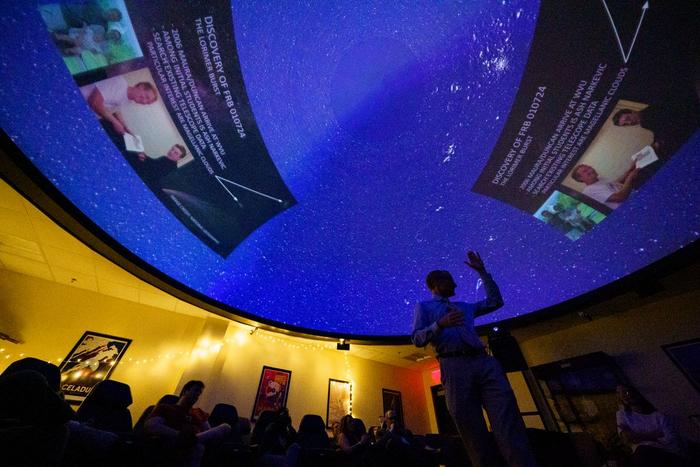
Credit: Scott Lituchy
A globally recognized leader in astronomy at West Virginia University has been elected to one of the top scientific academies in the world.
Duncan Lorimer, professor of physics and astronomy in the WVU Eberly College of Arts and Sciences, has been selected as a 2024 Fellow of the Royal Society of London for his contributions to pulsar astrophysics and his role in the discovery of fast radio bursts.
Founded in 1660, and now the oldest continuously running organization of its kind, the Royal Society is an independent scientific academy devoted to advancing science for the betterment of humanity.
Annually, the Royal Society’s Fellowship elects new fellows and foreign members from a variety of disciplines in the scientific community who have demonstrated excellence in furthering understanding of fields including the physical sciences, mathematics, medicine and engineering. This honor has been described as “the scientific equivalent of a lifetime achievement Oscar.”
Lorimer, who also serves as associate dean for research in the Eberly College, first received the news in March.
“I got the news after coming out of class,” he said. “Interestingly, we’d been studying Hawking radiation from black hole explosions in class that day, which was one of the landmark achievements of Stephen Hawking (who was elected to the Royal Society in 1974) and something that has been hypothesized as a source of fast radio bursts. My immediate reaction when I started looking at past and present fellows was, ‘Wow!’ Being connected to this legacy was quite awe-inspiring and emotional for me.”
The Royal Society represents the United Kingdom’s research community and collaborates with global partners to advocate for science and its benefits. It offers advice on scientific matters supporting public welfare, including policies promoting outstanding science and scientific insights informing policy decisions. It also provides financial aid to scientists, funds programming and organizes conferences to encourage discourse and collaboration.
Lorimer is one of 90 researchers to be elected to the Royal Society this year.
“I and everyone at Eberly College are exceedingly proud of Dr. Lorimer and his groundbreaking work,” said Eberly College Dean Gregory Dunaway. “His contributions to the field of astronomy have changed what we, as a society, know about outer space. Dr. Lorimer’s work and stature in his field makes him highly deserving of this most prestigious honor.”
“Professor Lorimer’s election to one of the top scientific academies in the world is a testament to the quality of the University’s research enterprise,” WVU Vice President for Research Fred King said. “Over the past two decades, he has helped build the WVU astrophysics profile into a global leader.
“Not only is Professor Lorimer devoted to his own research, but he has trained the next generation of astrophysicists and has been a strong proponent of STEM education, especially in the state of West Virginia.”
There are currently around 1,800 Royal Society fellows, including 85 Nobel laureates. Fellowship has been awarded to renowned scientists throughout history including Isaac Newton, Benjamin Franklin, Charles Darwin, Albert Einstein, Mary Cartwright, Dorothy Hodgkin, Jocelyn Bell-Burnell, Elizabeth Blackburn and Donna Strickland.
“I look forward to advocating for science in general, in particular fostering the next generation of scientists,” Lorimer said. “I was, for example, so fortunate to have been a Royal Society Research Fellow myself over 20 years ago and that helped springboard my own career. I look forward to helping with initiatives to give back to the community as part of the Royal Society’s mission.”
Originally from County Durham in the North East of England, Lorimer joined the WVU faculty in 2006. His teaching has been acknowledged with awards from both the Eberly College and the WVU Foundation. In 2018, he received the Benedum Distinguished Scholar award.
Lorimer’s innovative techniques in observations using radio telescopes around the world have been widely adopted by the astronomical community. To date, he has co-authored 286 refereed papers, which have garnered more than 30,000 citations.
He played a significant role in several large-scale radio surveys including the Parkes Multibeam Survey for pulsars, the most successful survey of its kind to date, in which he led the analysis of the statistical data related to neutron star populations and their progenitors and their evolution. Lorimer is also a founding member of the NANOGrav Collaboration, which performs high-precision timing of an array of millisecond pulsars. In 2023, NANOGrav made a major breakthrough in providing evidence of a low-frequency background of gravitational waves.
Lorimer is best known for his role in the discovery of the first fast radio burst — an intense, unexplained pulse of energy from billions of light years away that last only a few milliseconds. Since this discovery in 2007, several thousand more fast radio bursts have been discovered and WVU faculty and students are part of an international group actively engaged in studying these enigmatic sources. In 2023, along with Maura McLaughlin and Matthew Bailes, Lorimer was awarded the Shaw Prize in Astronomy in recognition of the significance of the discovery of fast radio bursts.
Since 1994, he has supervised five postdoctoral scholars, 20 postgraduate students and 30 undergraduate students in a wide variety of research projects. Working with McLaughlin at WVU, Lorimer has also engaged more than 200 high school teachers and 2,000 high school students in pulsar research.
As a WVU faculty member, Lorimer has been a principal investigator, co-investigator or senior personnel on 28 external proposals which have brought in more than $37 million of research funding.
-WVU-
cb/js/5/20/24
MEDIA CONTACT: Jake Stump
Director
WVU Research Communications
304-293-5507; Jake.Stump@mail.wvu.edu



